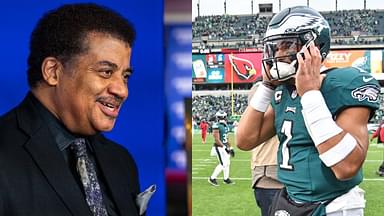The hip-drop tackle in American football has been a controversial move that has seriously injured many players. After much outcry against this tricky technique, the NFL has finally banned the move and as expected, a major controversy has erupted. While some support this ban, many critics are arguing against the decision, questioning its impact on game strategies.
Advertisement
In a recent segment on “NFL ON CBS,” former New York Jets defensive end Leger Douzable voiced his concerns about the NFL’s decision to ban the hip drop tackle. He believes that football is loved for its physicality, but rules like this can take that away from the game. He stated,
“They are taking the physicality out of football by implementing rules like this. Injuries do happen, again, you want to try to mitigate or minimize those. But in certain scenarios, injuries just happen. It’s a part of the game. We always had a saying in a locker room like football is 100% injury rate when you’re playing, because they’re going to eventually get hurt playing this game.”
View this post on Instagram
While Leger understands the need to reduce injuries, the veteran footballer also thinks that injuries are after all a part of the game. Douzable feels that defenders are being unfairly targeted with penalties and fines, making it tough for them to give their best.
He also highlighted several rules that he believes heavily favor offensive players, such as restrictions on touching receivers after five yards and penalties for late hits on quarterbacks. Leger thinks that the rules are already heavily in favor of the offensive players, and the hip-drop tackle ban is only going to make things worse for them.
NFL Finally Bans Hip-Drop Tackle
NFL owners, in a meeting on Monday, decided to ban a specific type of tackle known as the “hip-drop tackle.” This tackle involves a defender grabbing the runner with both hands, then dropping his hips and lower body to trap the runners’s legs below the knee.
The NFL has banned the hip-drop tackle, source said. The Competition Committee was unanimous on it.
— Ian Rapoport (@RapSheet) March 25, 2024
However, from now onwards, if a player performs this tackle, it will result in a 15-yard penalty and an automatic first down. The decision to ban this tackle came after the league found 230 instances of it in the previous season. NFL’s executive vice president, Jeff Miller, highlighted that this tackle often leads to injuries for the ball carriers.
NFL players reacting to the league banning the hip-drop tackle… https://t.co/fFzGJqe7oO pic.twitter.com/qSChmUGfP4
— Ari Meirov (@MySportsUpdate) March 25, 2024
Although the NFL Players Association opposed the ban, stating concerns about confusion for players, coaches, and even officials, the league has moved forward with the decision. Overall, banning the hip-drop tackle might make it harder for defenders to execute their strategies, leading to big changes in how the game is played. Moreover, the game might also lose some of its appeal, as fans do love the sport for its roughness.





